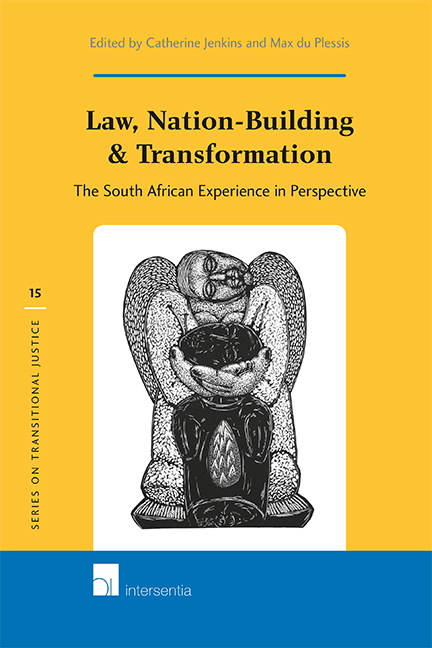Book contents
- Frontmatter
- Editors’ Foreword
- Contents
- Chapter 1 Transitional Justice: Lessons from South Africa?
- Chapter 2 Reflections on Post-Apartheid Nation-Building: Identity, Participation, Community
- Chapter 3 The Truth and Reconciliation Commission Process: A Retrospective
- Chapter 4 Rights at Work: The Transition to Constitutional Democracy and Women in South Africa
- Chapter 5 Crime, Policing and Nation-Building
- Chapter 6 Public Schools for Afrikaners in South Africa
- Chapter 7 Behind the Mask of the Rainbow Nation: The Limits of Law in Post-Apartheid South Africa
- Chapter 8 The Transformation of the Judiciary
- Chapter 9 Assessing the Social Transformation Performance of the South African Constitutional Court: From Totalitarianism to the Rule of Law
- Chapter 10 The Transformation of Land Law
- Chapter 11 The South African Presidency in Comparative African Context
- Chapter 12 Aspects of the Treatment of Freedom of Expression in South Africa’s Democratic Transition
- Chapter 13 Constitutionalism in Commonwealth Africa: Comparative Perspectives
Chapter 10 - The Transformation of Land Law
Published online by Cambridge University Press: 16 December 2020
- Frontmatter
- Editors’ Foreword
- Contents
- Chapter 1 Transitional Justice: Lessons from South Africa?
- Chapter 2 Reflections on Post-Apartheid Nation-Building: Identity, Participation, Community
- Chapter 3 The Truth and Reconciliation Commission Process: A Retrospective
- Chapter 4 Rights at Work: The Transition to Constitutional Democracy and Women in South Africa
- Chapter 5 Crime, Policing and Nation-Building
- Chapter 6 Public Schools for Afrikaners in South Africa
- Chapter 7 Behind the Mask of the Rainbow Nation: The Limits of Law in Post-Apartheid South Africa
- Chapter 8 The Transformation of the Judiciary
- Chapter 9 Assessing the Social Transformation Performance of the South African Constitutional Court: From Totalitarianism to the Rule of Law
- Chapter 10 The Transformation of Land Law
- Chapter 11 The South African Presidency in Comparative African Context
- Chapter 12 Aspects of the Treatment of Freedom of Expression in South Africa’s Democratic Transition
- Chapter 13 Constitutionalism in Commonwealth Africa: Comparative Perspectives
Summary
INTRODUCTION
I will introduce my discussion of the transformation of land law with a disclaimer, followed by a number of broad assumptions that I rely on but will not argue. Having stated these assumptions I will first set out a context and then proceed to dwell on the specific point about transformation that I want to discuss in this chapter.
First, the disclaimer. In the post-1994 South African context, it was always clear that land reform had to be an important part of social and economic transformation and hence people understandably associate land law with land reform; many readers, especially from outside South Africa, might therefore expect an introductory overview of the land reform process. However, as I want to discuss a specific aspect of land reform in this chapter I will not give a broad overview of the land reform process or the system of legal and other measures involved in it; nor will I analyze or assess the failures and shortcomings of the land reform programme or review possible solutions or remedies for them.
In the absence of a general discussion of land reform it is necessary to start with a number of general assumptions that I take for granted, without explaining or arguing them. I will therefore just state these assumptions as a point of departure. Firstly, I assume that it is now widely accepted that apartheid land law was not and could not have been dismantled purely through the abolition of the apartheid laws of the former minority regime. Secondly, I assume that the lasting legacy of apartheid land law (evident in remaining problems with access to land and housing, continuing evictions and the like) was not and could not have been rectified automatically by the promulgation of the land reform laws.
Thirdly, I assume that, apart from the abolition of apartheid laws and the promulgation of land reform laws, a complex range of further legislative, administrative and judicial interventions are required if the land reform process is to succeed on a significant scale.
- Type
- Chapter
- Information
- Law, Nation-Building and TransformationThe South African Experience in Perspective, pp. 241 - 256Publisher: IntersentiaPrint publication year: 2014

